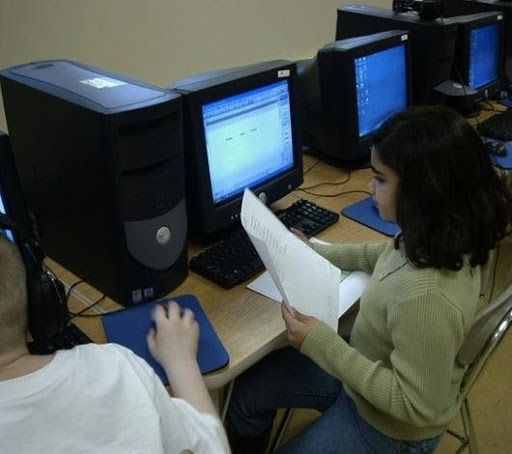On a crisp Friday morning in October, Gaby stepped out of her mom’s minivan, a rolled-up poster tucked under her arm. As she approached the spot where she usually met up with the other newspaper staff members before school, she began thinking back on the events of the past week.
On Monday, she’d been sitting in the computer lab, typing away furiously, when Principal Summers approached, clutching a stack of papers.
“I’ve been going over this week’s articles, Gabriela,” she said. “They’re wonderful as usual. But I’m Concerned about this story,” she pointed to one page in particular.
Gaby nodded; she knew that the article would raise some eyebrows. One of her newest reporters, Tomas, had discovered that a large group of first graders were very upset because they weren’t allowed to apply for a business license or open a Micro venture on their own. His article opposed this rule and spotlighted the positives of allowing the younger kids to open a business by themselves.
“Some of the rules we have here may not seem fair, but we take many different things into consideration. We think the first graders are too young to understand everything that needs to be done to open a business, especially filling out the license form.”
“I understand, Mrs. Summers. But I think the story needs to be told. The first graders deserve to be heard.”
“And I certainly understand why they are upset,” Mrs. Summers said. “But I don’t think it would be a good idea to publish this article when we don’t intend to change the rule.”
Gaby nodded, but her mind was still reeling. When she shared the information at the newspaper meeting that afternoon, Tomas was devastated. “This is so unfair! Isn’t this…” he paused, searching for the right word. “Censorship? We just learned about this in Mr. Cartright’s class. The first amendment guarantees freedom of the press!”
The rest of the staff agreed. “YEAH! If we can’t publish Tomas’ article, we shouldn’t publish anyone’s article!”
“Are you saying we should go on strike?” Gaby asked.
And so it was settled. The newspaper would hold a strike on Friday morning.
“Gaby!” The sound of Tomas’ voice snapped her back into the present. She waved to him as she unrolled her poster to reveal the words “No Censorship!” in glittery-purple marker. Glancing around, she was pleased to see a big turnout – the entire newspaper staff and a group of first graders had shown up.
After a brief meeting, they began marching around the school, signs in hand. Down the hallways, around the picnic table, even right by the principal’s office.
“Don’t censor us!” the reporters cried. “Let us speak!” the first graders shouted.
Mrs. Summers arrived at the school, wondering about the commotion. “Is this a strike?” she asked one of the first graders.
“It sure is!”
Mrs. Summers saw Gaby in the crowd, and motioned for her to come over. For a moment, Gaby wondered if they’d gone too far. Was she going to get in trouble?
Mrs. Summers smiled. “Gaby! I can’t believe you organized an entire strike over the article. I’m actually very impressed.”
Gaby let out a big sigh of relief. “Really? We just felt like we were being censored, and— “
“True, what I did was technically a form of censorship,” Mrs. Summers admitted. “However, it was within my rights as the principal to review the articles.” Gaby’s smile began to fade.
Mrs. Summers continued, “That being said… I had no idea how passionate the first graders were about opening their own businesses. I’m wondering if we should have a meeting to discuss this issue further. Maybe if the first graders had older kids helping them fill out the paperwork…”
Tomas and Gaby looked at each other in disbelief.
“But I can’t make any promises. We’ll see.” Mrs. Summers said.
“Tomas, I’m sorry we can’t publish your article,” Gaby said softly. “But it sounds like it’s already made a difference.”
Tomas was busy scribbling on his reporter’s notepad.
“Tomas?” Mrs. Summers asked, trying to get his attention.
“That’s okay,” he said with a smile. “I’m already working on my next story: Newspaper strike leads to change in legislation!”
